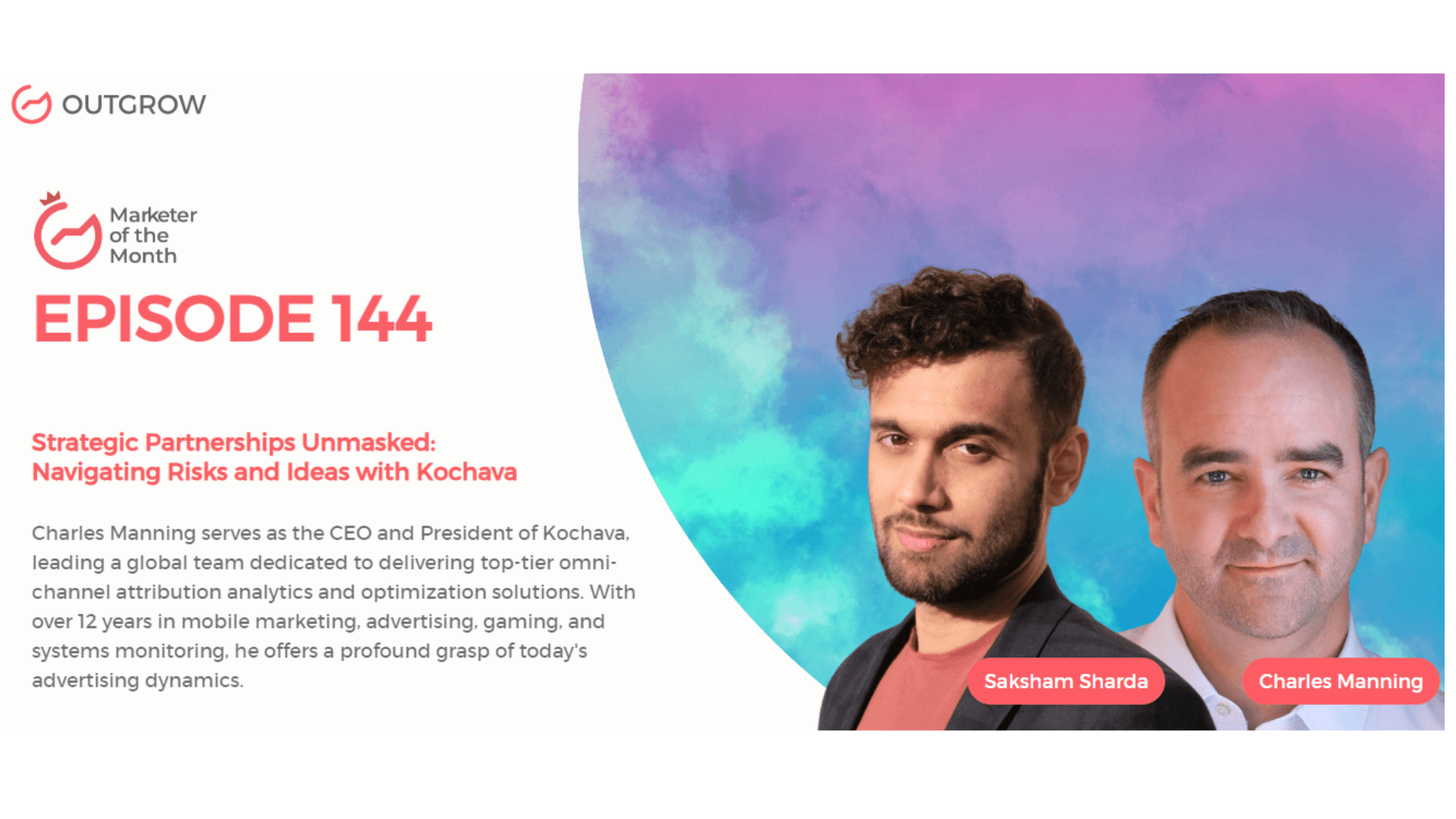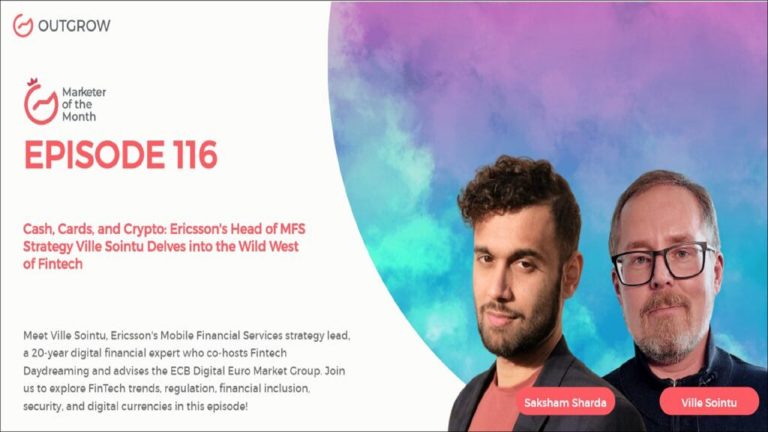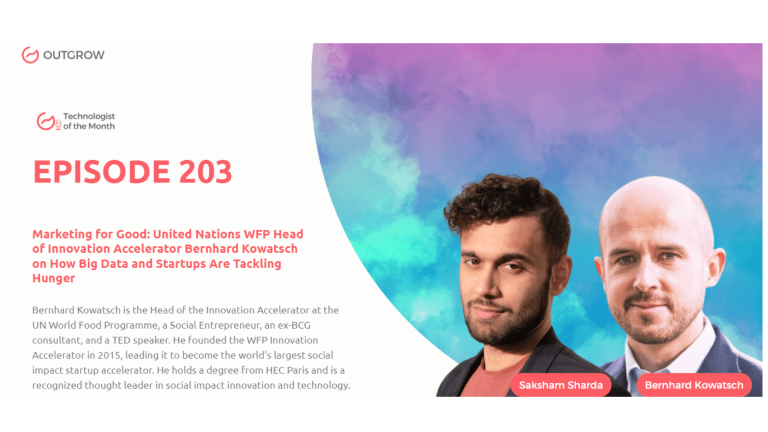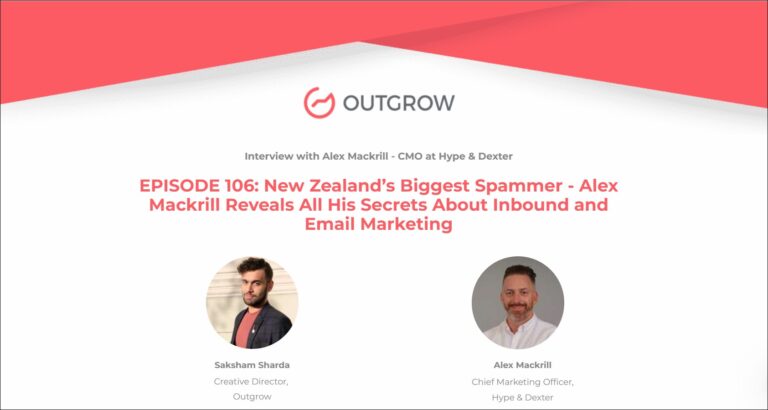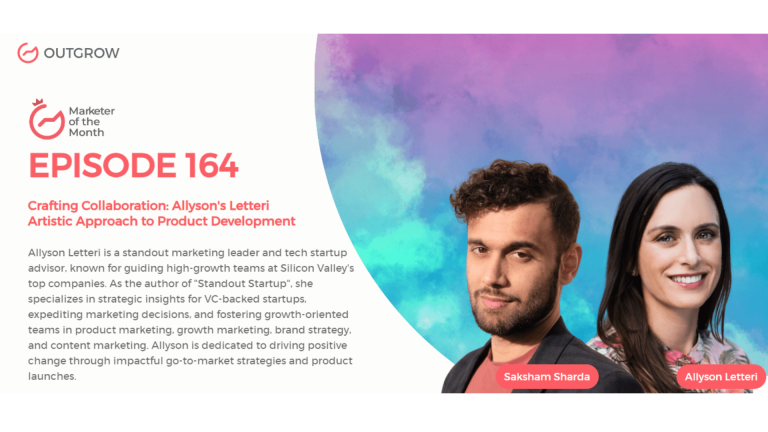EPISODE 144: Marketer of the Month Podcast with Charles Manning
Table of Contents
Hey there! Welcome to the Marketer Of The Month blog!
We recently interviewed Charles Manning for our monthly podcast – ‘Marketer of the Month’! We had some amazing insightful conversations with Charles and here’s what we discussed about-
1. Importance of Product Management: Perceives product managers as dynamic mini-CEOs shaping diverse facets.
2. Downsides of Strategic Partnerships: Risk of prematurely underselling ideas.
3. Gaming Industry Impact: The fusion of entertainment and skill is a timeless trend in the gaming industry.
4. Future Trends from Gaming: Anticipates growth in marketplace commerce, parallels with loyalty programs.
5. Enterprise Software Market: Contemplates the paradigm shift in consumption patterns
6. Micro SaaS Trend: Pivotal role of unified ROI for sustained success.
About our host:
Dr. Saksham Sharda is the Chief Information Officer at Outgrow.co. He specializes in data collection, analysis, filtering, and transfer by means of widgets and applets. Interactive, cultural, and trending widgets designed by him have been featured on TrendHunter, Alibaba, ProductHunt, New York Marketing Association, FactoryBerlin, Digimarcon Silicon Valley, and at The European Affiliate Summit.
About our guest:
Charles Manning serves as the CEO and President of Kochava, leading a global team dedicated to delivering top-tier omni-channel attribution analytics and optimization solutions. With over 12 years in mobile marketing, advertising, gaming, and systems monitoring, he offers a profound grasp of today’s advertising dynamics.
Strategic Partnerships Unmasked: Navigating Risks and Ideas with Kochava
The Intro!
Saksham Sharda: Hi, everyone. Welcome to another episode of Outgrow’s Marketer of the Month. I’m your host, Dr. Saksham Sharda, and I’m the creative director at Outgrow. co. And for this month we are going to interview Charles Manning who is the Founder and CEO of Kochava.
Charles Manning: Great to be here. Thank you.
Don’t have time to read? No problem, just watch the Podcast!
Or you can just listen to it on Spotify!
The Rapid Fire Round!
Saksham Sharda: Okay, let’s go. Describe what your organization does in one sentence.
Charles Manning: Kochava builds attribution and measurement technology for advertisers and publishers.
Saksham Sharda: How long does it take you to get ready in the mornings?
Charles Manning: I’m a pretty easy preparer. I am ready within 30 minutes. I always cook breakfast for the family, so that’s usually what takes up the majority of my time in the morning.
Saksham Sharda: Most valuable skill you’ve learned in life?
Charles Manning: Patience and persistence.
Saksham Sharda: City in which the best kiss of your life happened?
Charles Manning: Newport Beach.
Saksham Sharda: How many speakers can you name at this conference?
Charles Manning: I suppose you’ll ask me to name them.
Saksham Sharda: You can pass.
Charles Manning: Pass.
Saksham Sharda: In one sentence, describe one problem that your organization is facing.
Charles Manning: Organizational leverage to further scale faster.
Saksham Sharda: How do you relax?
Charles Manning: Swimming in the morning in the lake.
Saksham Sharda: A habit of yours that you hate?
Charles Manning: I’m too critical when things aren’t perfect.
Saksham Sharda: Work from home or work from the office.
Charles Manning: Work from the office.
Saksham Sharda: How many hours of sleep can you survive on?
Charles Manning: I typically sleep five hours a night.
Saksham Sharda: Your favorite app?
Charles Manning: Probably a combination of the feeds. So Facebook and LinkedIn.
Saksham Sharda: Biggest mistake of your career?
Charles Manning: I don’t know. The biggest mistakes are often opportunities. I think I started my first company after being at Oracle for a couple of years, and sometimes I wonder if I should have stayed at Oracle for a few more years to learn more lessons. But I have always liked starting companies, so I can’t imagine that scenario. So maybe not a mistake
Saksham Sharda: The first movie that comes to your mind when I say the word technology.
Charles Manning: Star Wars.
Saksham Sharda: How many cups of coffee do you drink in a day?
Charles Manning: I probably drink a pot of coffee a day. Maybe Four cups.
Saksham Sharda: Favorite Netflix show?
Charles Manning: Pass.
The Big Questions!
Saksham Sharda: Right. So that was the end of the rapid fire. So we’re gonna go for bigger questions and these you can answer with as much ease as you like. What are your views on product management skills that one requires in the field of tech nowadays?
Charles Manning: Awesome. Product management is, I believe, one of the most important roles in an organization. I think of product managers as miniature CEOs for their particular, um, area of focus. And what that means is typically few people work for you, but it’s your job if you’re successful, to be influential to everyone ranging from engineering to marketing, to, you know, go to market and PR. And if product managers believe that their job is simply to write PRDs, they’re not in the right business. If product management believes that their job is to do program management or project management, they’re not in the right business. And equally, product management is also not, you know, pie-in-the-sky brainstorming in perpetuity and never getting anything done. It truly is like a cross-functional, strategically important role. And I think that is the success of technology companies. Today is your product team.
Saksham Sharda: How does one go about looking for such a product manager in the first place?
Charles Manning: I think of product managers, as I mentioned, as miniature CEOs. And so, I think it depends on the maturity stage of an organization. You can look for young, green, enthusiastic individuals who can fill important aspects of product management, providing you with the right leadership over time. I think what you want to do is recruit individuals who will likely be running a company in the next five to 10 years and think about that in that context. You know nothing is perfect. I’m not suggesting that we have been perfect at doing that at Kochava, but, I think that’s the north star that you should be driving toward if you’re in a leadership role of a company.
Saksham Sharda: Apart from all the benefits, do you think planning strategic partnerships may have a downside too?
Charles Manning: Yeah, I think if I understand the question correctly, I think the downside is you sell yourself out too short and too quickly. Oftentimes, if you’ve got a great idea, you think you know who would value this, you know who would benefit from this, and you identify the strategic partner candidate and instead of building it, you effectively educate the partner that you would otherwise have a lot of opportunity to emulate and replicate. And so I think there’s a really important balance when you desire to go to market fast, the tendency is to say, well, let’s be partners and they can help accelerate. But if you do it too early, then you don’t give yourself the time to think through and to become pregnant with the vision and the passion for whatever that thing is without kind of handing off your baby to another partner.
Saksham Sharda: And a lot of people believe that making partnerships is the future, though. So what do you have to say about that?
Charles Manning: Certainly, organizations are far more loosely coupled mosaics than they were in the past. Meaning partnerships are far more strategically important today than they were 10, or 15 years ago. Having said that, um, comes back to your north star of what’s your vision and what’s your strategy and what’s below the line, which is good opportunities for partnership and what’s above the line, which is what you have to own wholeheartedly and have it be yours and only yours. And so differentiating creates a nice clean governance framework to keep yourself accountable on what you’re partnering on versus what you want to make sure you’re developing yourself.
Saksham Sharda: Do you agree with this statement? The online gaming industry is creating a unique union between entertainment and skill.
Charles Manning: A hundred percent. And has been doing so for 20-plus years. Massively multiplayer online games were the first social network before social became big. And what was underappreciated was that they were the first social networks because the real community and real relationships were being developed around a common digital platform. And in the case of MMOs, it was stateful. You know, there were time-based sessions with raids. There was, and it still is, but that arguably was the first rendition of Metaverse and Love. People love to talk about Metaverse changing, but this is just a continuum of what happened in games and went, from MMOs to social games to mobile games and now a whole variety of other types of games. But a hundred percent agree with that statement.
Saksham Sharda: So, what else do you think is going to come from gaming into tech in the future?
Charles Manning: Marketplace commerce, we’ve seen some of that with Ts, specifically around, um, thinking about in-game items as redeemable and transportable goods. Item trading has been around, so that’s obviously not new. What is new is having it hit a mass adoption curve. Interestingly, in our business, we’re in the business of helping brands, big brands identify what’s efficient about their ad spend. And part of that is owned media. So paid media is where you spend money on social platforms and ads to drive adoption to your product or service owned media is where you have your digital properties and you’re promoting another digital property. And one of the areas of real growth that we believe in for 2023 and beyond for big brands is really around loyalty. And loyalty is just another version of in-game items. And the parallels are very consistent. And so in many respects what we’ve seen in gaming is the pattern and template for what we’re seeing out of gaining using similar constructs. And we’re certainly observing that.
Saksham Sharda: What do you think is the reason behind the enterprise software market gaining popularity and what challenges did it face due to the pandemic? Or is it going to face a recession as well?
Charles Manning: Yeah, I mean, enterprise software is certainly not new. I would argue what’s new is how enterprise software is being consumed. So in client-server days, through the nineties, enterprise software is what made companies like Oracle become successful. The compositing of the framework of enterprise software, SaaS delivery, and um, some of them, as a service-oriented aspect of enterprise software certainly makes adoption much easier. Then, the problem I would argue is that it’s made it so easy that you’ve got companies that are not companies, they’re features, and one of our favorite phrases in the company is F N A C, which is Feature, Not A Company. Meaning what should be a standalone thing with interoperable partnership capacities versus what is better for the brand or the consumer of that enterprise software as a roll-up of capabilities.
Charles Manning: And so that’s an important differentiator. Building features is one thing, but accumulating customers is another. If you’ve got an advertiser, or if you’ve got 10 startups and all of them want to sell into the Fortune 1000 customer base, they all have to replicate an SDR framework, a go-to-market framework, a mechanism to reach out and engage with those prospects. They all have to get DPA agreements, they have to get through legal, and they have to, go through an onboarding process. And if all 10 of those companies are relatively in the same category, they’re going to be a company. And so the question is who’s gonna get out first and own the distribution channel with the customer? And, the answer to that will be who the winner is for the category.
Saksham Sharda: So what do you think of the trend of micro SaaS? Like so many features turning into products and people thinking that that’s gonna be the future as well?
Charles Manning: Yeah. Well, as a company with several hundred employees, we have lots of tools and I would argue we have more tools than we should have. But there will be an individual who thinks that that tool is gonna make them more successful and they’ll throw a credit card down, it’s below a threshold, and so they get started, and then it gets adopted and maybe it uses and it’s got an integration strategy. Everything about your question is applicable and you can see why that takes fire. But in a world where recession is looming subscription management became important. Our CFO is looking at what tools are critical, and what are we already getting from other scenarios and we’re tightening that build. So, when times are heady and exciting, it’s great to create a business that may be a micro SaaS offering. But when unified ROI is an important attribute, if you’ve ever really hit scale with customers, you better figure out how you’re gonna be part of a bigger package. Our technology is what we sell to advertisers. We provide media cost aggregation to provide seed analytics and provide attribution, measurement and data pipelining, data syndication, and data enrichment. Those are all individual companies. But we provided one platform and so what we are able to tell the CFO as well as our customers, marketer, and CMO, do you get natural economies of scale by using our platforms? That’s all.
Saksham Sharda: In your opinion, how difficult is it to build a career in the business development industry?
Charles Manning: I would argue that it’s easy to get started in business development. It’s difficult to build a career in business development. You’re either a rainmaker and closing business and bringing in cash. Or you’re a talker. I’m not suggesting ideas are a dime a dozen. I think there’s an argument for that. That’s not my point in this argument. Ideas are one thing, execution of those ideas is an entirely different thing. Either you are a career-developed business development person, you’re synthesizing ideas and synchronizing with teams to get things done, or you’re bringing in money. And if you’re not doing one of those two things with an outcome-based approach, you’re not building a career. You’re dabbling and beating.
Saksham Sharda: And the last question for you kind of related to this is, what would you be doing in your life? If not this?
Charles Manning: I really love what we’re doing. We not only build measurement and attribution and tracking software, but I’m also very much a data person visualization person. Cookshop is bootstrapped. And what that means is we’ve had an awful lot of autonomy. We’re not being told to stay in our lane, by venture partners who are on our board telling us we’re not allowed to deviate or think about other areas. We’ve ended up building a layer one blockchain technology. We built a consent management framework that ended up being really beneficial to our brand customers. That’s a separate whole category of business. We built a data business because our customers asked for it. And it’s just a question of what are you doing? I’m satisfying my curiosity and desire to do lots of things. Because of the framework in which we’re working in a kind of company we’ve built. There are times when I employ people on the team and bring people on the team. And they’re not used to the autonomy of things and diverse activities that we’re doing. They are used to working for a larger company where they work on one specific swim lane. And it concerns them and frustrates them that there are so many things that are going on. But for the right individual, it can be pretty special. So if I weren’t doing this, I would probably be doing something just like having the same kind of expansive charter.
Let’s Conclude!
Saksham Sharda: Thanks, everyone for joining us for this month’s episode of Outgrow’s Marketer of the Month. That was Charles Manning who is the Founder and CEO of Kochava.
Charles Manning: Pleasure. Thanks for having me.
Saksham Sharda: Check out the website for more details and we’ll see you once again next month with another marketer of the month.

Muskan is a Marketing Analyst at Outgrow. She is working on multiple areas of marketing. On her days off though, she loves exploring new cafes, drinking coffee, and catching up with friends.

